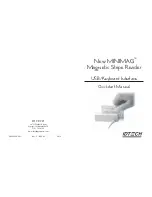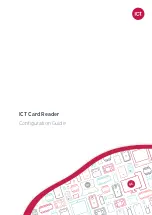
Installation and User Instructions for S854 Readers
You should find that the
backplate has holes for
connection to most
standard electrical
backboxes.
With the backplate off (see above), mount
the backplate adjacent to the opening edge
of the door and at a convenient height. Feed
the required cables through the backplate:
The cable from the controller.
The cable from the heater, if used (must
be a separate cable).
A cable from a Remote Interface Module
(RIM), if used. A RIM can reduce cable
lengths to door furniture.
2
The optional heater kit maintains the reader at
the correct temperature when mounted outside.
With the backplate off, remove the backing paper
from the two elements, then stick them to the
inner sides of the reader. The heaters must be
connected to a 24V AC supply (min 25VA).
When mounting outside, the two-part gasket kit
must be fitted:
a) Remove the backplate from the reader by
releasing the two securing screws.
b) Remove the cutouts and backing paper
from the two gaskets, then stick them to the
backplate as shown.
Outer gasket
Inner
gasket
Backplate
securing screws
Backplate
1
Fit the Weatherproofing Kit
Mount the Backplate
Set LK1 (USER FB) to 1 for sound on, or 0 for sound off. Set LK3 (COMMS) across the center and WGD
pin for Wiegand communications, or across the center and C/L pin for 20mA current loop
communications.
3
Reader Links
The S854 is a combined contact and
with LCD and keypad. The reader can be set to use Wiegand or
p
The S854 is able to read Personal Identity Verification (PIV II) type A
and B, Philips MIFARE and Philips MIFARE DESfire smart cards.
For Philips MIFARE and Philips MIFARE DESfire cards, the S854
supports the use of unencoded cards (where only the unique card
serial number is read), or cards encoded with a card number.
Several encoding formats are supported.
The reader can simultaneously support two different card
types/formats (e.g. non-encoded MIFARE and smartMAX-encoded
MIFARE DESfire, or non-encoded MIFARE and smartMAX-encoded
MIFARE). The reader is automatically configured to accept the first
two card types/formats presented after power is applied.
contactless smart-card reader,
20mA current loop seudo-random communications.




















